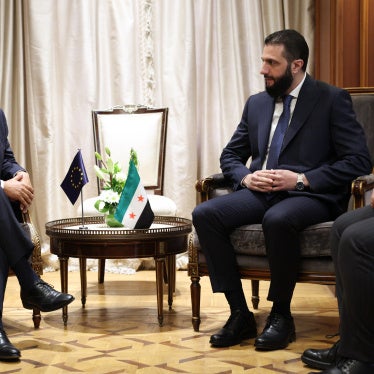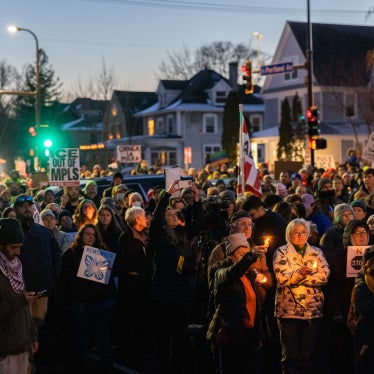By imposing sanctions today on Uzbekistan over its refusal to allow an independent inquiry into the Andijan massacre, the European Union gave new impetus to international efforts to pursue accountability for atrocities committed in the Uzbek city on May 13, Human Rights Watch said today.
Human Rights Watch called on the European Union to follow up on this important step by actively working to garner support for an independent, international inquiry from important non-EU countries including Russia, during the EU-Russia summit on Tuesday.
While convening in Luxembourg for their monthly General Affairs and External Relations Council today, EU foreign ministers decided to impose specific sanctions on Uzbekistan, including a partial suspension of the Partnership and Cooperation Agreement—the framework that regulates the European Union’s relationship with Uzbekistan.
The decision came after the European Union repeatedly called on the Uzbek authorities to allow an independent, international inquiry into the Andijan killings. EU foreign ministers had made it clear that the Partnership and Cooperation Agreement was at stake if the Uzbek authorities failed to cooperate in pursuing accountability for the May massacre.
“With today’s decision, the EU has given much-needed concrete meaning to its human rights policy,” said Holly Cartner, Europe and Central Asia director of Human Rights Watch. “At its summit with Russia tomorrow, the European Union should redouble its efforts to gain Russian support for an international inquiry into the Andijan killings.”
The decision marks the first time in the European Union’s history that it has suspended a Partnership and Cooperation Agreement with another country. The Agreement contains a human rights clause that states: “respect for democracy, principles of international law and human rights … underpin the internal and external policies of the Parties and constitute essential elements of partnership and of this Agreement.”
“The Uzbek government had long flouted the terms of the Partnership and Cooperation Agreement with no real consequences on EU-Uzbek relations,” said Cartner. “We are pleased to see that this has now changed.”
The suspension of the agreement excludes elements that have an immediate impact on the general population and continues to permit assistance to civil society.
In its landmark decision today, the European Union further imposed an embargo on arms exports to Uzbekistan, similar to the one it imposed on China following the Tiananmen Square massacre in 1989. It also enacted an EU-wide ban on member countries from issuing visas to “those individuals directly responsible for the indiscriminate and disproportionate use of force in Andijan.”
Significantly, measures taken by the European Union today make it clear that it will actively pursue an international, independent inquiry into the Andijan events. The European Union “requests” member states to use available avenues in fora such as the Organization for Security and Cooperation in Europe and the United Nations, and “calls on like-minded countries to co-operate to this end with EU Member States.”
In this context, Human Rights Watch urged the European Union to use its summit with Russia to raise its concerns about Uzbekistan with Russian President Vladimir Putin and seek Russia’s support for an independent, international inquiry into the Andijan events. Russia has been a staunch supporter of Uzbekistan since the Andijan massacre. Joint military exercises between the two countries took place in September, two months after the Uzbek government asked the United States to leave its military base in southern Uzbekistan.
“Russia can play a crucial role in ensuring accountability for the Andijan massacre,” said Cartner. “This week’s summit in London provides an important opportunity for the European Union to demonstrate its resolve by seeking President Putin’s support on this issue.”
Human Rights Watch also stressed the immediate need for the European Union to ensure continuous international monitoring of the ongoing trials of those charged with instigating the demonstrations that preceded the massacre in Andijan. However, such monitoring should by no means be seen as a substitute for the much-needed international, independent inquiry. In this regard, Human Rights Watch urged the European Union to press Uzbekistan to allow urgent access for relevant U.N. human rights monitors, including the Special Rapporteurs on Torture and Extrajudicial Executions, the Secretary General’s Special Representative on Human Rights Defenders, and the Working Groups on Arbitrary Detention and Forced Disappearances.
On May 13, Uzbek government forces killed hundreds of unarmed protesters as they fled a demonstration in Andijan. To date, the government has taken no steps to investigate or hold accountable those responsible for this atrocity. Instead, it has steadfastly denied any responsibility for what happened and conducted a massive crackdown to silence the witnesses and conceal the truth behind the massacre. As a result, the precise death toll remains unknown, as do details regarding the specific units responsible for shooting unarmed civilians. There is no clear, confirmed information about what happened to the bodies of those killed or the fate of those wounded who were taken to the hospital.
“The many unresolved questions about the Andijan massacre can only be answered by an independent, international inquiry,” said Cartner. “The EU decision today showed resolve toward ensuring that such an inquiry takes place.”







